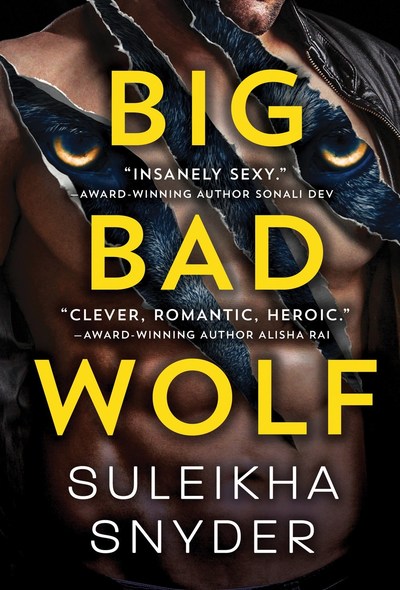This sensual seasonal sampling of holiday romances has something for every reader.
★ In a Holidaze
A young woman gets a holiday do-over in In a Holidaze by author duo Christina Lauren. Maelyn Jones is looking forward to her annual Christmas celebration with family and friends, including her longtime crush, Andrew. But when it looks like she’s ruined her chance with him, some magical force intervenes and she gets a replay . . . or two. Trapped in a time loop in which she experiences the same cabin vacation over and over, will she seize the opportunity to pursue her heart’s desire? Lauren’s first holiday romance is feel-good from the get-go. Set in Park City, Utah, there are snowball fights and games around the fire, along with a pair of protagonists who are reluctant to upend decades of conviviality by changing their relationship. The story and characters have a cozy, old-fashioned vibe, and the love scenes are warm but not too detailed. In a Holidaze is an engaging and entertaining treat, with no sharp edges and plenty of seasonal sparkle.
A Highlander Is Coming to Town
A small Southern town celebrates Christmas in A Highlander Is Coming to Town by Laura Trentham. Highland, Georgia, has a genuine Highlander in its midst when traveling Scottish singer Claire McCready arrives in town. With her 25th birthday and a life-complicating inheritance looming, she hopes to lie low for the holidays while working as a live-in helper for a crotchety elderly woman. But despite her desire to stay attachment-free, Claire finds herself attracted to sexy neighboring farmer Holt Pierson. Claire plans to return home soon, so maybe they can indulge in their hot chemistry without anyone getting hurt. There are tropes on tropes in this charming story—the poor little rich girl, the fish out of water, the homebody vs. the wanderer—and readers will sink into this comforting read like it’s a warm bath. Glimpses of characters from previous books in the series add to the cozy feel.
Christmas at Holiday House
More than one heart finds its match in RaeAnne Thayne’s Christmas at Holiday House. For Abigail Powell and her young son, Christopher, the town of Silver Bells, Colorado, sounds like the perfect place to spend the month between Thanksgiving and Christmas. She can help her best friend Lucy’s grandmother recover from a fall and give Christopher a snow-covered Christmas before they move to Texas. But she didn’t count on the compelling attraction of Lucy’s brother, Ethan. During the days of skiing, baking and general holiday merriment, Abby and Ethan share tender embraces, even though he thinks he doesn’t have the loving nature required to be her man. Meanwhile, Lucy struggles with similar self-doubts as she returns home to face an old friend who’s no longer silent about his feelings for her. This is romantic fantasy, pure and simple. It shines with holiday cheer, but Thayne also makes the goodness of these characters feel true. This kisses-only story is perfect for lovers of Christmas and romance.
A Princess by Christmas
Christmas comes to Victorian England in A Princess by Christmas, the third installment in Julia London’s Royal Wedding series. Young widow Hollis Honeycutt welcomes her sister and best friend—both married to foreign royals—to London while the queen hosts peace talks between the fictional countries of Wesloria and Alucia. Through the social events surrounding the occasion, Hollis meets the mysterious Marek Brendan, who is attached to Wesloria’s trade delegation. Curious and clever, Hollis begins to investigate for the biweekly ladies gazette she publishes and finds herself inexplicably drawn both to Marek and into the political intrigue surrounding the talks between the two rival countries. The unbending Marek makes an ideal foil for the ebullient Hollis, and they fall in love surrounded by the era’s traditions, such as elaborate wreaths and a party to celebrate the newfangled German import of a seasonal tree. Author London pens an imaginative tale peopled with smart, well-drawn characters who feel genuine in their love for one another. This thoroughly enjoyable romance is a stylish, fabulous escape to another time and place.
Christmas at the Island Hotel
Happy ever afters of all sorts abound in Christmas at the Island Hotel by Jenny Colgan. The author returns to the fictional and remote Scottish island of Mure, the setting of Christmas on the Island and The Endless Beach, where the impending holiday and the successful opening of a new hotel is critical to several residents: Fintan, a grieving widower who inherited the property; his sister, Flora, who finds her maternity leave a bit dull; Gaspard, a temperamental French chef; Konstantin, a playboy of a Norwegian prince who’s been ordered to work for the first time in his life; and Isla, a hardworking Mure native who is about to learn what love is. Told in the affectionate and understanding voice of an omniscient observer, this holiday tale sets readers smack-dab in the center of the island community, and it’s a delightful place to spend the season. As there ought to be at any proper Christmas, there are dogs and children and family strife, not to mention a little melancholy, as well as good food and good times.








 How to Catch a Queen
How to Catch a Queen Bayou Dreaming
Bayou Dreaming The Way You Hold Me
The Way You Hold Me





















